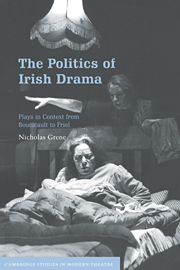Book contents
- Frontmatter
- Contents
- Acknowledgements
- Chronology
- List of abbreviations
- Introduction
- 1 Stage interpreters
- 2 Strangers in the house
- 3 Shifts in perspective
- 4 Class and space in O'Casey
- 5 Reactions to revolution
- 6 Living on
- 7 Versions of pastoral
- 8 Murphy's Ireland
- 9 Imagining the other
- Conclusion: a world elsewhere
- Notes
- Bibliography
- Index
9 - Imagining the other
Published online by Cambridge University Press: 22 September 2009
- Frontmatter
- Contents
- Acknowledgements
- Chronology
- List of abbreviations
- Introduction
- 1 Stage interpreters
- 2 Strangers in the house
- 3 Shifts in perspective
- 4 Class and space in O'Casey
- 5 Reactions to revolution
- 6 Living on
- 7 Versions of pastoral
- 8 Murphy's Ireland
- 9 Imagining the other
- Conclusion: a world elsewhere
- Notes
- Bibliography
- Index
Summary
Benedict Anderson in Imagined Communities defined as essential to nationalism the capacity for imagining a whole community of individuals one would never meet but who were imagined as similar to oneself, similar in attitudes, ideas, the practices of life. That imagined identification (which Anderson associated with the growth of print-capitalism) allowed the idea of the nation as a binding unity to be created. But in post-Independence southern Ireland such an imagined similarity has constantly been verified by social actuality. One of the features of the partitioned post-1922 Free State/Republic, without the six counties of the North, without the substantial number of Anglo-Irish Protestants who drained away in the 1920s, has been its social and cultural sameness. It is not, of course, that Irish society has been without variety or differentiation: everywhere there are and have been class conflicts, gaps between rich and poor, rural and urban, the inveterate rivalries of region with region. Still, in a state where more than 90 per cent of the people share and practise the same religion, a religion, what is more, which has tended to admit of very little variation; in a society where nationalist belief, active or inert, is so widely accepted, so little challenged – in such a state, in such a society, the imagination of anything other than being Catholic and nationalist becomes genuinely difficult.
- Type
- Chapter
- Information
- The Politics of Irish DramaPlays in Context from Boucicault to Friel, pp. 242 - 260Publisher: Cambridge University PressPrint publication year: 2000



